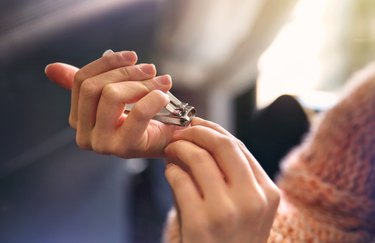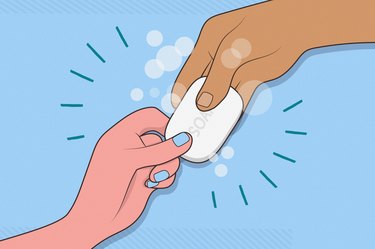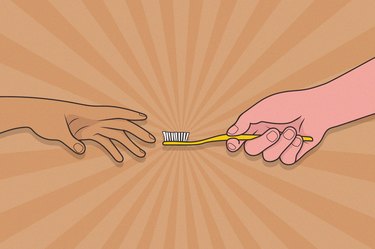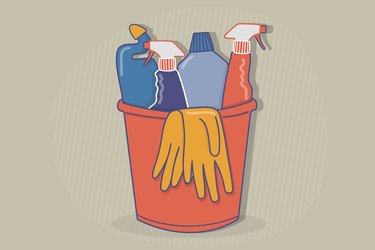
Your partner or roommate is cutting their nails when you realize you could use a trim yourself, so you ask them to hand over the clippers when they're done. No big deal, right?
Actually, it's kind of a risky move.
Video of the Day
Video of the Day
You should never share nail clippers with someone else (even a spouse or family member), warns the American Academy of Dermatology (AAD). When you pass that pair of silver trimmers back and forth, you're at risk for picking up something gross.
Risks of Sharing Nail Clippers
Sharing nail clippers can transmit infections in your nails or in the surrounding skin, including onychomysosis (nail fungus), ringworm and athlete's foot, says the AAD. (You're also at risk when you share nail files, shoes, skates or towels, by the way.)
To be fair, the risk is relatively small when you're a healthy adult sharing clippers with another healthy adult.
"A healthy immune system can often protect you from potential infections," says Brendan Camp, MD, clinical assistant professor of dermatology at Weill Cornell Medical College in New York City. "But there's still a risk when you're using contaminated tools."
If one clipper user in the household has a nail or skin infection, the chances of it spreading to another person using the clippers is nearly 50 percent, according to a January 2022 review in the Journal of Fungi.
Bacteria or fungi are more likely to cause an infection if you have an open cut around your nails, Dr. Camp says. Having diabetes or a condition that weakens your immune system also makes you more susceptible, per the Centers for Disease Control and Prevention.
The kinds of infections spread by nail clippers aren't usually serious unless you have a compromised immune system. But problems like athlete's foot and ringworm can be itchy and uncomfortable. And fungal infections can make your finger- or toenails dry, brittle, discolored or smelly — and they take months to clear up, the Mayo Clinic notes.
How to Sanitize Nail Clippers
Buying your own set of nail clippers and not sharing them is an easy way to reduce your risk for nail and skin infections, Dr. Camp says. That's especially important if someone in your household has a known infection, or if you're at higher risk for infections.
If you're using someone else's clippers, you should sanitize them first, the AAD recommends. You can do that by washing them with soap and water and wiping them down with rubbing alcohol. (Sanitizing means you're lowering the amount of dirt and germs on a surface to a safe level. It's not the same as sterilizing, which, when done properly, eliminates all dirt and germs, Dr. Camp points out.)
As for natural options like vinegar or essential oils? They might get rid of odors, but they're not approved disinfectants, so steer clear.
How to Tell if Your Nail Salon Is Sterilizing Their Nail Tools Properly
If you like to get your nails done at a salon, you can reduce your chances of getting an infection from a pair of shared clippers by making sure their tools are properly cleaned in between uses.
"Ask the salon if the tools are cleaned and disinfected between each patron," Dr. Camp says.
At the very least, all of the tools your nail tech uses should be sanitized before they touch your nails, the AAD says. If your salon is sanitizing, the clippers and other tools should be completely immersed in a liquid disinfectant solution for at least 10 minutes. The tech should use tongs or gloves to remove the tools from the solution, then rinse the tools and let them dry.
Most salons sterilize their tools, Dr. Camp says. Usually, the process is done in an autoclave, a microwave-shaped device that uses steam heat to kill microorganisms.
If you're concerned about germs and nail infections, a salon that sterilizes is a safer bet over one that just sanitizes.
If you can't say for sure whether a salon is cleaning their tools properly, or if you're uncomfortable using shared tools, consider skipping the salon in favor of an at-home manicure or pedicure, recommends Dr. Camp.
Sure, you could bring your own tools to the salon. But if they're not de-gunking their clippers, think about what else in the salon might be harboring germs.
Using someone else's nail clippers can put you at higher odds for a nail or skin infection. While the risk isn't huge for healthy adults, there's a good chance you'll pick up germs if the person you're sharing with has an active infection. You're also more likely to get sick if you're at higher risk for infection yourself.
Considering a pair of nail clippers costs about the same as a cup of coffee, why take the risk when you can just buy your own pair?
Is this an emergency? If you are experiencing serious medical symptoms, please see the National Library of Medicine’s list of signs you need emergency medical attention or call 911.



